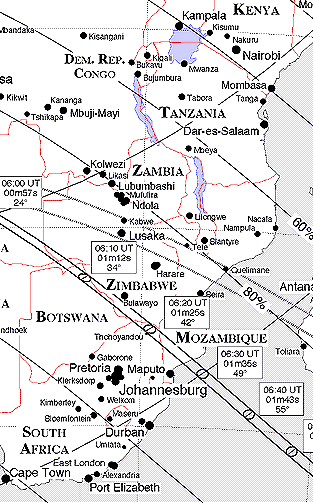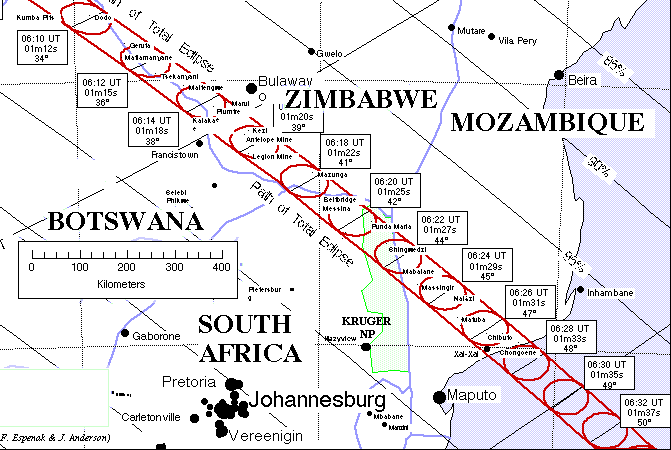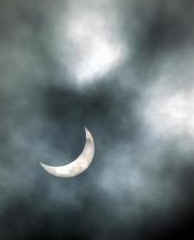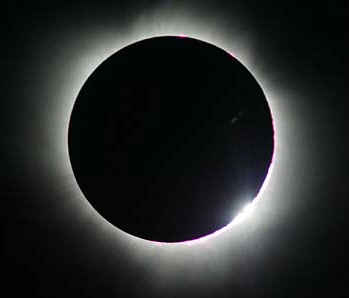
Leave camping this morning to transfer to the viewing location, with. First contact is at approx 07:25 am. Totality begins at about 8:14am, lasting approximately 1 minute, 22 seconds.
The moon's shadow first hit the southern Atlantic at 0550 GMT, then raced eastward speeds greater than 3,125 miles per hour, streaking across Angola, South Africa, Botswana, Zimbabwe and Mozambique.

Here is more detailed on the path in Northern provinces of South Africa

It was interesting to read stories about the lore related to the stars and heavens including about eclipses in Southern Africa. The local people in that region of Africa include the Venda or vhaVenda, Shangaan and Sotho people located in the Limpopo province.
The Venda call the solar eclipse Mutshakavhili. The occurrence is considered
The occurance of a solar eclipse is perceived as a strange event and it is also associated with negative things.
The vhaVenda people believe that solar eclipse and earth quarke are associated with N'wali ( the vhaVenda God). It was believed that if solar eclipse were to occur, it means that N'wali was paying them a visit and he he would be angry and concerned about something that they were doing which was forbidden in their culture.
If they were to continue to practice the things that N'wali was angry about, draught was one of the punishment and this was a bad thing to the people, since most of them were depending on subsistence farming for survival. Rivers would dry and also most of their livestock would die.
It is also believed that there would be confusion and war in the village and many families would loose their loved ones, especially men (men would die).
The things which were done during and after the event.
During the occurrence of solar eclipse people were not allowed to watch the event, because it was believed that N'wali would be passing. They were supposed to hide or close their eyes until the event is over. It was believed that if you take part and watch in observing these phenomena, you would be strucked by lightning and burn to ashes.
Immediately after the event, those who were outside ploughing and looking after animals were supposed to go back to their homes.
When everything is back to normal, it means that N'wali has reached his special cave in Makonde village. The cave would be serving as a home during his visit he would staying the cave and wait for the old men he appointed as his messengers. After the event then old men would go to the cave and find out why N'wali is angry and what is it that they need to do in order to rectify the mistake.
After a meeting with N'wali, the old men will take the news to the chief of Makonde village and then he would be the one to call his people to attend to attend a special gathering and explain to them why N'wali is angry and what they must do in order to rectify the mistake.
During the meeting people would set a date for special ceremony in order to ask for forgiveness. People would then go to the chief's place where cows would be slaughtered and food would be prepared. The chief, the old men and a few appointed elders from the royal family would take the food that has been specially prepared by the elders to the cave and also some of the things that N'wali has asked for. All the offerings must be placed at the Entrance of the cave, and for them to see that N'wali has accepted their apology. It is said that a fire would come from the cave and consume all the offerings.
Then the chief and his people would return to the village where they will the people the good news and it is only then that they will start to eat the food and drink traditional beer, rejoicing that they have been forgiven. In the evening the village would experience rain.
It is said that the last time the N'wali visited the village, he was complaining that his people are no longer worshiping him they are adopting other people's culture and they should not plough their fields with tractors, they must not continue to build modern houses and those that have been built already must be demolished and women should not go out and look for jobs and they should concentrate much on looking after their families.
Shangaana People:
The Tsonga name of Solar eclipse is called `Kubola kadyambi'. This can be translated as
the rotting of the sun. This ethnic group associate this event with their beliefs. It is
believed that once this event occur in the specific area which is affected or experiencing
the total Solar eclipse there is someone who did wrong acts and therefore the God of their
Gods called `Kokwani' is angry and his anger is upon the specific area affected or
experiencing the total Solar eclipse.
Causes of Kokwani's anger:
Kokwani's anger could be manifested if a member of a community do what the whole society
has been prohibited to do. For example to burry an infant in graveyard is a taboo, they
are supposed to be buried along the stream, also to bury a person who die because of TB in
a graveyard is a taboo. They are or were supposed to be buried along the stream too,
abortion was also a taboo, to have sexual intercourse with biological child was/is also a
taboo or to have sexual intercourse with animals was also a taboo etc. If one could do
these Kokwani was going to manifest his anger through solar eclipse and this was a sign
that there would be a great drought if something is not done to calm Kokwani's anger.
What was their reaction during the event:
Because of the fact that they believed Solar eclipse symbolized Kokwani's anger, every one
could hide himself or herself whether a home or anywhere because of fear of Kokwani's
anger. If there is no place to hide in they could just close their eyes until the event is
over and this could be done by just falling down and closing eyes. One can make an
inference saying that their reaction was good for the sake of their health it was not
their purpose when they hide or close their eyes as it is scientifically known that it can
affect the retina of the human eyes. After the event, during that day people were supposed
to leave every thing that they were doing.
How did they prevent such drought:
The tribal chief, headmen and elders and the affected community were supposed to consult
traditional healer to found out what was wrong and who is responsible for the act. The
responsible person was the one who was supposed to pay all charges to the traditional
healer as commanded by the chief.
The chief, headmen and elders were supposed to gather old men and old women for ancestral worship, which was done at specific unique area. For instance in Maphapha village there is a place called `Nwa-Ritanda' where they usually do their ancestral worship. It was believed that this unique place was the dwelling place of`Kokwani'. So villagers could go there particularly old women and old men with the staff of the Chief to worship Kokwani'. It is said that they could only worship Kokwani being naked. During the worship day villagers who were not fit for worship were not allowed not allowed to go out of the village before they hear a trumpet from N'wa-Ritanda which was a sign that they are done with the worship.
So to see a whether their worship has been accepted they could not reach their respective homes before it starts raining. And after every thing the guilty person or family were going to be charged again by the King or chased out of the village.
Conclusion:
They way Shangaana people viewed Solar eclipse was at least good for their health in one
way or another especially to the effects that solar eclipse has on human eyes, this is
because during those days there were no instruments that could be used to look at the sun
during the event.
of Northern Sotho people
Mmolatsatsi goba phifalo ya letsatsi (solar eclipse)
This is an event whereby the sun gets dimmed or gets shutdown completely. This event is perceived differently by different people guided by their traditions, this means that the Vhavenda speaking people will perceive solar eclipse occurrence differently from Sepedi speaking people. In sotho, it is perceived that solar eclipse occurence is associated with wrong doings such as practicing taboos. Sepedi speaking people perceive solar eclipse occurrence as marriage between the sun and the moon. They believe that the moon is marrying the sun because according to their knowledge the moon is bigger than the sun.
When solar eclipse occurs, people perceive it as an indication that harsh environmental conditions such as drought, floods etc are about to prevail in the area of occurrence. To the Christians, solar eclipse brings happiness because they think that the almighty one is coming back. People also believe that solar eclipse brings miscarriages to pregnant women. Other says that solar eclipse occurs as a result of disobedience of the ancestors, culturally it is believed that a child below the age one year(infants) should not be buried in the graveyards rather it should be buried in the household yard. Taboos such as setting fire light in the graveyards or cemeteries.
Because it is believed that solar eclipse occurs as a result of wrong doings, the Sepedi speaking people believe that it is a punishment from the ancestors and there is nothing they can do to reduce the punishment, instead they have to face the consequences which are mostly drought that result in famine.
The moon’s shadow raced across southern Africa today delighting residents, viewers, and scientists, and in general aficionados from all walks of life, including 5,000 tourists in Kruger National Park. Although darkness would prompt some animals to bed down for the night but its short duration and the presence of thousands of humans persuaded most animals to stay awake.
The sky was not perfect for an eclipse, with clouds moving in since early in the day. The skies above the town of Messina were clear and blue, allowing for a marvellous experience.
The diamong ring was excellent and the corona was not very bright and showed only a few streamers. The planets Mercury (closest to the sun), Mars and Venus, which were directly above us, were visible with the naked eye during the peak of the eclipse


At its widest, the total eclipse's shadow, or umbra, was about 87 kilometres wide.
Complete the day with an eclipse postmortems onsite and back at the camp.
This time not only satellites had a chance to photograph the eclipse from space, but also
the science officer (Don Pettit) was able to photograph it from out the
window of the International Space Station.

The shadow was racing across the Indian Ocean at the time this picture was made.
VMG © 2002